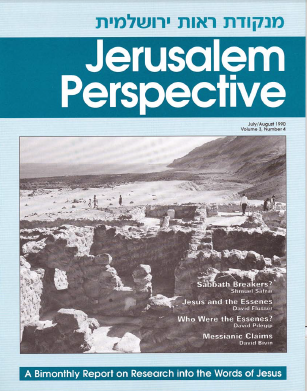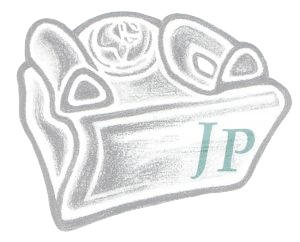JP readers frequently ask:
Has an ancient Hebrew gospel, which was the source of our canonical gospels, ever been discovered?
David Bivin responds:
Although the church fathers testify that Matthew wrote the words of Jesus in Hebrew, not a single fragment of an early Hebrew manuscript containing Jesus’ sayings has survived from the first centuries of the Christian era.[1]
The entire text of Matthew’s gospel is contained in Even Bohan, a fourteenth-century Hebrew work, and George Howard has published that text of Matthew. Howard’s work is an important contribution to the study of the Semitic background of the Gospels. However, the title of his publication, The Gospel of Matthew According to a Primitive Hebrew Text (Mercer University Press, 1987), has again fueled rumors that an ancient Hebrew manuscript of the sayings of Jesus has been found.
It appears to me that the text of Matthew found in Even Bohan is the translation of a fluent Hebrew writer of the medieval period, rather than a revision of an early Hebrew composition, as Howard claims.
Jerusalem Perspective dealt with the possible discovery of an ancient Hebrew Gospel in its first issue, which you can read on JP by clicking here.

- [1] For dates of the earliest manuscripts of the Gospels, see the JP post, “When Were the Gospels Written?” ↩






































































Comments 2
David and or JP,
Could you kindly flush out the important “It appears to me…” phrase in your response? I’d love to better understand your reasoning.
Thanks and shalom!
Gary
The Even Bohan version of Matthew’s Gospel shows many signs of being of relatively late origin. We would expect a Hebrew Gospel composed in the first century to reflect first-century Hebrew idiom, but frequently Even Bohan shows signs of late Hebrew. For instance, in early rabbinic sources “to repent” is expressed as לעשות תשובה (“to do repentance”) whereas in late rabbinic and medieval Hebrew sources “to repent” is expressed as לחזור בתשובה (“to return in repentance”). Even Bohan‘s Matthew uses the latter expression (cf., e.g., Matt. 12:41).
Some verses in Matthew are highly Hebraic in nature, preserving Hebraisms like “Amen” and other Hebraic idioms. There are instances in Even Bohan that are less Hebraic (despite being written in Hebrew!) than Matthew’s Greek (see below). Other verses in Matthew look like they have been subjected to a certain amount of Greek editing. We would expect a Hebrew Matthew from the first century to be free of such Greek interference. Even Bohan‘s Matthew, on the other hand, reflects this Greek interference (see below).
Matthew 5:18 offers an excellent test case because it contains both highly Hebraic features and signs of Greek editing. In Greek the verse reads:
ἀμὴν γὰρ λέγω ὑμῖν ἕως ἂν παρέλθῃ ὁ οὐρανὸς καὶ ἡ γῆ ἰῶτα ἓν ἢ μία κεραία οὐ μὴ παρέλθῃ ἀπὸ τοῦ νόμου ἕως ἂν πάντα γένηται
Amen / for / I say / to you / until / ever / might pass away / the / heaven / and / the / earth / iota / one / or / pen stroke / one / no / not / might pass away / from / the / law / until / ever / all / happens.
Hebraic features in this verse include “Amen,” “heaven and earth,” and “iota and pen stroke” (probably a reference to a yod and its qotz, see David N. Bivin and Joshua N. Tilton, “The Significance of Jesus’ Words ‘Not One Jot or One Tittle Will Pass from the Law’ (Matt. 5:18)”; and David N. Bivin, “Matthew 5:17: ‘Destroy’ the Law”).
Greek interference is probably found in the γάρ (“for”) and in the final phrase ἕως ἂν πάντα γένηται (“until everything comes to pass”; cf. Matt. 24:34 and par., where the same formula appears, and cf. Luke 16:17 where the formula is absent).
A Hebrew retroversion of Matt. 5:18 after the elimination of Greek interference might read:
אמן אני אומר לכם עד שיבטלו שמים וארץ לא יבטל יוד אחד ולא קוץ אחד מן התורה
Amen! / I / say / to you / until / that are annulled / heaven / and earth / not / will be annulled / yod / one / and not / qotz / one / from / the Torah.
But compare this idiomatic reconstruction to Even Bohan‘s version of Matt. 5:18:
באמת אני אומר לכם כי עד שמים וארץ אות אחת ונקודה אחת לא תבטל מהתורה או מהנביאים שהכל יתקיים
In truth / I / say / to you / that / until / heaven / and earth / letter / one / and dot / one / not / will be annulled / from the Torah / or / the prophets / because everything / will be fulfilled.
Even Bohan‘s version of Matt. 5:18 not only preserves all the Greek interference (כי = γάρ; שהכל יתקיים = ἕως ἂν πάντα γένηται), but it reflects an inferior text that included καὶ τῶν προφητῶν (“and the prophets”), which Christian copyists imported from Matt. 5:17.
Moreover, Even Bohan‘s version of Matt. 5:18 cannot explain the Hebraic elements in the Greek text. In place of Matthew’s “Amen” Even Bohan‘s version has “truly,” or “verily.” How did Greek Matthew end up with the Hebrew word ἀμήν if the original had read באמת (“truly”)? Neither can “letter or dot” explain the choice of “iota or pen stroke” in the Greek text (why iota and not some other Greek letter?). Indeed, “letter or dot” is a glaring anachronism, referring to pointed Hebrew texts that did not come into existence until hundreds of years after the time of Jesus. Note, too, that Even Bohan’s version of Matt. 5:18 is just terrible Hebrew. It’s syntax is poor and its vocabulary is somewhat bizarre.
From the phrase באמת אני אומר לכם (“truly I say to you”) we would even go so far as to suggest that Even Bohan is a translation of a translation. The phrase באמת אני אומר לכם is not a translation of Matthew’s ἀμὴν…λέγω ὑμῖν (“Amen! I say to you…”), it renders into Hebrew an interpretation of what someone thought ἀμὴν λέγω ὑμῖν means. The easiest explanation is to suppose that Even Bohan is a Hebrew translation of a translation (Spanish? Italian? Arabic?) of Greek Matthew. (According to David Bivin it was Shmuel Safrai’s opinion that Even Bohan was a Hebrew translation of an Arabic translation of Matthew that Shem Tov had at his disposal.)
For additional examples of Even Bohan‘s secondary character, see the LOY segments Generations that Repented Long Ago and Waiting Maidens parable (coming soon).